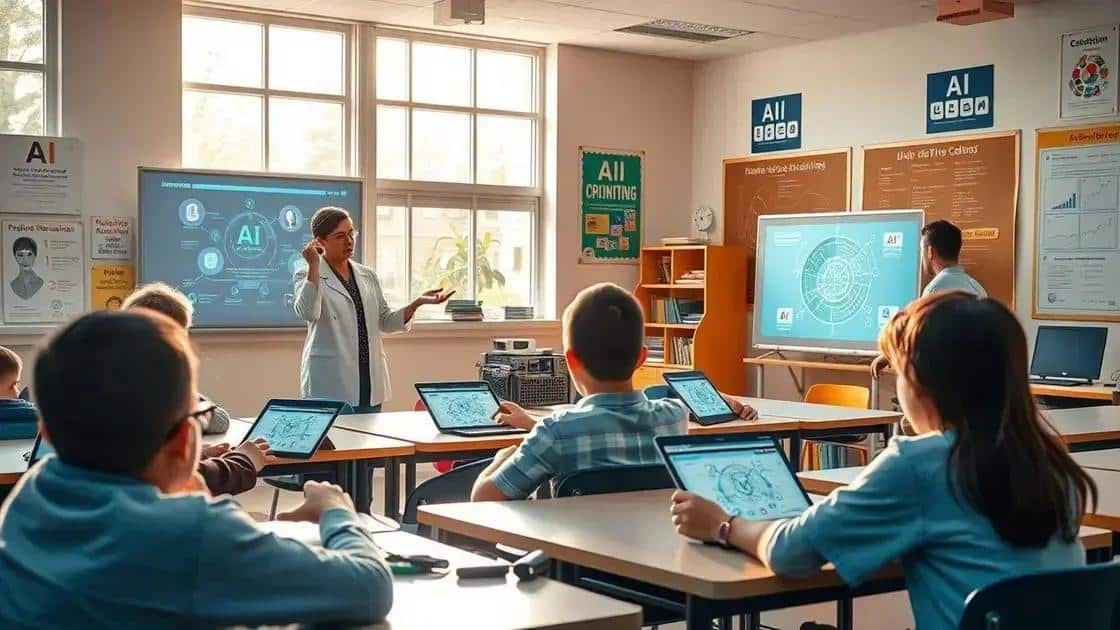AI tutoring programs – emerging trend in education

AI tutoring programs offer personalized learning experiences that adapt to each student’s needs, enhance engagement through interactive content, and provide real-time feedback to improve academic performance.
AI tutoring programs are becoming increasingly popular in the education sector. They promise to offer tailored learning experiences that cater to individual student needs. Have you considered how these innovations might enhance your learning journey?
Understanding AI tutoring programs
Understanding AI tutoring programs is essential for today’s educational landscape. These programs use advanced technology to provide personalized learning experiences. Unlike traditional tutoring, AI programs adapt to each student’s unique needs, offering tailored lessons.
What are AI tutoring programs?
AI tutoring programs are software solutions that leverage artificial intelligence to assist students in their learning journeys. They can provide real-time feedback and suggest resources based on a student’s performance. This technology transforms the learning experience by making it more interactive and engaging.
Key Features of AI tutoring
- Personalized learning paths based on student’s strengths and weaknesses
- 24/7 availability, allowing students to learn at their own pace
- Detailed analytics for parents and teachers to track progress
- Interactive exercises that keep students engaged
These features contribute to a more effective learning environment. Students benefit from lessons that fit their learning style, which can lead to improved academic performance. For example, if a student struggles with math, the AI tutoring program can offer additional resources and exercises focused on that subject.
Moreover, as these programs evolve, they incorporate better algorithms for understanding student behavior. This ensures that the learning process is continually refined, making it easier for students to grasp complex topics. Imagine a scenario where a student is learning to solve equations. With AI tutoring, the program can adjust the difficulty based on the student’s responses.
Benefits of AI tutoring programs
- Increased student engagement through interactive content
- Enhanced comprehension with personalized support
- Flexibility to fit students’ schedules
- Immediate feedback to reinforce learning
In conclusion, AI tutoring programs are pioneering a new approach to education. They empower students by providing tailored support and enhance learning outcomes significantly.
Benefits of AI in education

The benefits of AI in education are significant and multifaceted. By integrating AI technologies, educational institutions enhance the learning experience while addressing diverse student needs. These advancements lead to improved student engagement, greater accessibility, and more efficient learning environments.
Personalized Learning Experiences
One major benefit is the ability to provide personalized learning experiences. AI-driven programs analyze students’ strengths and weaknesses, allowing for customized lesson plans. This tailored approach means that students can learn at their own pace, enabling them to grasp challenging concepts more effectively.
Increased Efficiency for Educators
AI not only supports students but also aids educators. With AI tools, teachers can automate administrative tasks, such as grading. This efficiency frees up time for instructors to focus on delivering quality instruction. For example, AI systems can quickly assess student work, providing instant feedback to both students and teachers.
Accessibility for All Students
- AI can help address learning disabilities by offering tailored resources.
- Students in remote areas gain access to quality education through AI tools.
- Language translation features make content accessible to non-native speakers.
- Voice recognition technology helps students engage with materials easily.
The integration of AI in education also promotes inclusivity. With features designed for diverse learners, more students can actively participate in the learning process. Imagine a classroom where every student, regardless of their background, has the tools they need to succeed.
Moreover, AI systems can adapt to changing learning environments. They can deliver relevant content and suggest resources in real time. This flexibility ensures that learning remains relevant and engaging. By analyzing data, AI tools can offer insights into student performance, helping educators make informed decisions about their teaching strategies.
How AI tutoring programs work
AI tutoring programs work by using advanced technology to personalize student learning. At their core, these programs analyze data to adapt lessons and provide targeted support based on individual needs. Understanding how these systems operate can help educators and students make the most of their capabilities.
Data Collection and Analysis
These programs begin with data collection. They gather information about a student’s progress, strengths, and weaknesses. By using algorithms, the AI can analyze this data to determine where a student may need extra help. This process is continuous, allowing the program to adapt as the student improves.
Customization of Learning Content
Based on the analysis, AI tutoring programs create customized learning paths for students. This means that if a student excels in reading but struggles with math, the program will provide more resources and exercises specifically targeted at math skills. This customization helps ensure that students focus on areas that need improvement.
Real-Time Feedback
- Students receive instant feedback on their answers, allowing them to learn from mistakes immediately.
- AI systems can suggest additional resources, such as videos or practice questions.
- Teachers can track progress through detailed analytics provided by the AI.
- Adaptive questioning techniques ensure that the difficulty of tasks matches the student’s skill level.
This feedback loop enhances the learning process, making it more effective. Students can see their progress in real time, which can boost motivation and encourage further engagement. For instance, if a student answers a question correctly, the AI might offer a more challenging problem to push their limits.
AI tutoring programs also utilize interactive elements. These can include quizzes, games, or virtual simulations that keep the student engaged. Such features are essential as they make learning fun and interactive. By incorporating these tools, students are more likely to stay motivated and interested in their studies.
The future of AI tutoring in schools

The future of AI tutoring in schools looks promising and exciting. As technology evolves, these programs will become even more integral to the educational experience. With advancements in AI, schools can offer more personalized, engaging, and effective learning environments.
Increased Integration in Classrooms
More schools are expected to incorporate AI tutoring into their curriculums. This integration will enable teachers to provide tailored support for students. As AI tools become more user-friendly, educators will harness their capabilities to enhance instruction and engage students.
Enhanced Personalization
Future AI tutoring systems will likely feature improved algorithms that can analyze student data more effectively. This will allow for even greater customization of learning experiences. Students might face personalized content that evolves based on their progress and challenges. As a result, they can receive materials designed specifically for their unique learning needs.
- AI can adapt to various learning styles, making education accessible for everyone.
- With real-time feedback, students will understand their learning gaps quickly.
- AI-driven assessments will be more accurate, reflecting student capabilities.
- Collaboration between AI and teachers will enhance educational strategies.
Additionally, advancements in technology will enable AI tutoring programs to incorporate elements like virtual reality. This innovative approach can create immersive learning environments where students can practice skills in real-world scenarios. For example, students studying biology could explore virtual ecosystems, making complex concepts easier to grasp.
AI tutoring will also likely promote global learning opportunities. Students from different parts of the world can connect and learn together via AI platforms. This collaboration can foster a deeper understanding of diverse perspectives and enhance cultural awareness.
AI tutoring programs are transforming education. They provide personalized learning experiences that can improve student engagement and achievement. As technology develops, these programs will continue to enhance education, making it more accessible and effective for all students. With features like real-time feedback and customizable lessons, AI tutoring is paving the way for a brighter future in learning.
FAQ – Frequently Asked Questions about AI Tutoring Programs
What is an AI tutoring program?
An AI tutoring program is a technology-based learning solution that personalizes education for each student by using data to tailor lessons and provide real-time feedback.
How does AI improve student engagement in learning?
AI enhances engagement by offering interactive content and personalized lessons that cater to each student’s learning style and pace.
What are the benefits of using AI in classrooms?
AI in classrooms provides personalized learning experiences, real-time feedback, 24/7 accessibility, and helps educators track student progress more efficiently.
Will AI tutoring replace traditional teaching methods?
No, AI tutoring is designed to complement traditional teaching methods, allowing teachers to provide more personalized support and improve overall student success.





